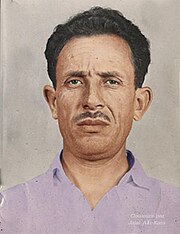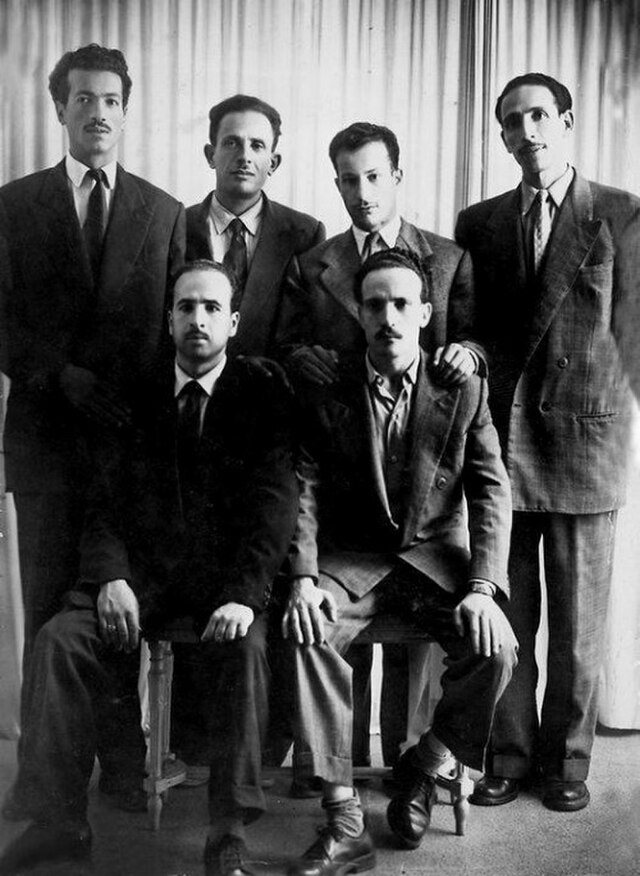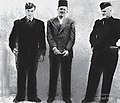Mostefa Ben-Boulaïd (Arabic: مصطفى بن بولعيد) (5 February 1917 – 22 March 1956) was an Algerian revolutionary leader.[1]
Mostefa Ben Boulaïd | |
|---|---|
 | |
| Born | February 5, 1917 |
| Died | March 22, 1956 (aged 39) Arris, Batna Province, French Algeria |
| Cause of death | Killed in action (KIA) |
| Resting place | Arris, Batna Province, Algeria |
| Organization | Armée de Libération Nationale (ALN) |
| Movement | Front de Libération Nationale (FLN), Comité Révolutionaire d'Unité et d'Action (CRUA), Organisation spéciale (OS) |

Biography
World War II
Ben-Boulaid was born in Arris, Batna Province, Algeria. In 1939, he underwent mandatory military service and was mobilized to fight for the allies during the Second World War. In 1944, during the Italian campaign, Ben-Boulaid exhibited courage, which earned him the Military Medal and the Croix de Guerre. He was demobilised with the rank of adjutant, returned home, and joined the Algerian People's Party.[1]
Revolutionary figure
Ben-Boulaid became an important political and military figure in the Special Organization (OS). He bought weapons with his own funds, supported militants being pursued by the French authorities and distributed arms.[1] Ben-Boulaid contested the Assembly of Algeria election of 1948 and won decisively. However, the colonial administration annulled the election.[1] He was a founding member of the Revolutionary Committee of Unity and Action. From 22 to 25 June 1954, he chaired a crucial meeting which aimed to unite the revolutionary forces. He became a member of the "Committee of the Six" ( the insurgent leaders). During the Algerian war, Ben-Boulaid was responsible for Area I (Aurès).[1] He engaged heavily armed French forces and suffered heavy losses. In 1955, he traveled to Libya to purchase arms.[1] He participated in the battle of Ifri el blah and the battle of Ahmar Khaddou near Batna.[citation needed]
Arrest and escape
On 11 February 1955, Ben-Boulaid was arrested in Tunisia. Ben-Boulaid was imprisoned at "Coudiat Jail", the "Central Prison of Constantine" and was sentenced to death. In November 1955, he escaped along other inmates, with the complicity of a prison warden, Djaffer Chérif, also called Lakhdar, who was a Chaoui from Béni Frah. One of the other prisoners was Tahar Zbiri, who went on to initiate a failed coup against President Houari Boumediene in 1967.[1] During the escape, one of Ben-Boulaid's comrades was injured, recaptured, and subsequently decapitated.
Death
On 21 March 1956, Ben-Boulaïd died in the blast of a parachuted French radio bomb.[2]
Gallery
- The tomb of Si Moustefa (right) and his companion Amrani (left) in Nara, Arris wilaya of Batna
- Photo taken after his arrest (11 February 1955)
Legacy
The main squares of Batna and Arris host busts of Ben-Boulaid. In Batna, an alley and a high school was named for him. In Annaba, one of the avenues that connects Bertagna boulevard (formerly Cours Bertagna) and the Avenue of the Revolution bears his name as do the neighborhoods of Saint-Cloud, Plaisance and Kouba, and beaches and Chapuis Toche. The airport of Batna is named after Ben-Boulaid.
In culture
In 2006-2007, Ahmed Rachedi produced a documentary Mostefa Ben Boulaïd (film) in collaboration with the Ministry of Veterans (Ministère des Moudjahidine) and the Ministry of Culture (Ministère de la culture et l'entreprise) and Missane Balkis films. It was part of the 2007 festival, "Algiers, Capital of Arab Culture" ("Alger, capitale de la culture arabe 2007").[3]
See also
Further reading
- Au forgeron de Batna, Jean-Pierre Marin, foreword by Jean Deleplanque[4]
References
Wikiwand in your browser!
Seamless Wikipedia browsing. On steroids.
Every time you click a link to Wikipedia, Wiktionary or Wikiquote in your browser's search results, it will show the modern Wikiwand interface.
Wikiwand extension is a five stars, simple, with minimum permission required to keep your browsing private, safe and transparent.



